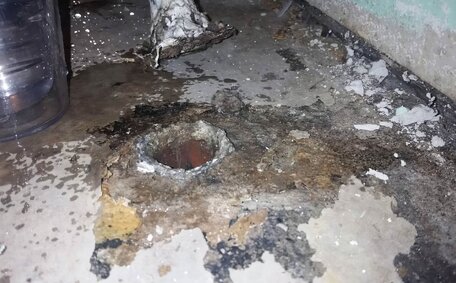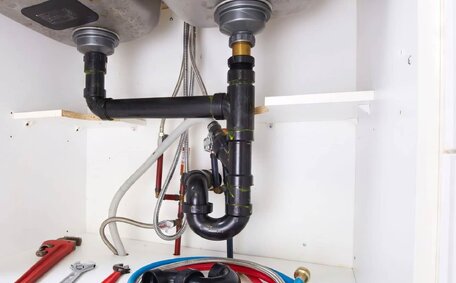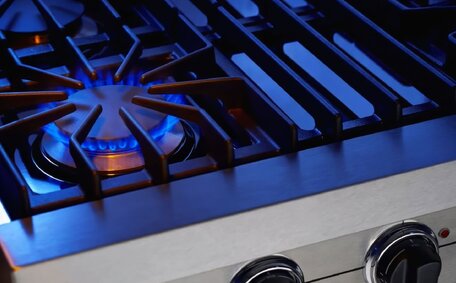Common Signs Your Sewer Line Is Blocked
Identifying a slow drain promptly is key to averting major plumbing problems. Keep an eye out for these signs, as they usually point to a sewer blockage affecting your plumbing network:
- Slow-draining sinks, tubs, and showers often indicate a blocked sewer pipe in your home.
- Gurgling noises from pipes, suggesting a possible backup in the sewer line
- A strong smell from your property could signal a damaged sewer line
- Pooling water in your yard or basement indicating a sewer line clogged beneath the surface
- Toilet overflows, slow draining, and water backing up in your shower or bathtub are definitive signs of a main sewer line clog
- Water backing up in the shower or bathtub is a straightforward sign that your sewer line is clogged
Your sewer drain may become blocked due to accumulations of household waste, grease, tree roots, or ground shifts causing obstructions. Should you notice any signs clogged such as water backing up or other indications of a sewer line blockage, contact a professional plumber right away to address the issue before it escalates into sewage backups, property damage, or health issues.
Where Sewer Line Clogs Typically Occur
A main line clog can develop in the drain that connects your house to the municipal sewer system. The main sewer line, generally ranging from 100 to 150 mm in diameter, is designed to handle accumulations of grease, tree roots, and other debris.
Line clogs also frequently occur in the main sewer drain pipe systems tied to fixtures within your dwelling:
- Kitchen sink blockages, often involving plumbing fixtures
- Bathroom sinks
- Showers and tub shower
- Toilets
- Your washing machine
Hair, soap scum, and various materials can build up over time, leading to blockages in your main sewer drain. Toilet paper and wipes are the most common culprits of plumbing woes that necessitate attention as soon possible to prevent further damage. Sections composed of older clay or cast iron piping were particularly vulnerable to root intrusion and corrosion-related issues, and are likely main sewer clog factors.
Watch out for any signs of a main sewer line clog, like gurgling drains, bad smells, or standing wastewater, which can result in unsavoury backups. If you suspect a clog, contact a local plumber immediately.
Preventative Maintenance To Avoid Blockages
To prevent blockages in your main sewer line, know what should and shouldn’t go down your drains. Avoid disposing of fats, oils, and grease down the drain as they can solidify and clog your pipes. Avoid flushing wipes, feminine hygiene products, dental floss, and other non-toilet paper items that can obstruct your main drain.
Regular inspections can detect early signs of problems, enabling timely intervention before issues in your main sewer line escalate. Using high-powered augers, drain snakes, and hydro jetting technology can clear blockages before they intensify and lead to backups.
Homeowners should install protective screens on secondary and sink drains to filter out hair, food waste, and debris, preventing clogs. Consider planting trees well away from your sewer lines to discourage roots from growing into and obstructing your drain system.
By staying vigilant over minor blockages, curbing the flow of unsuitable materials, and actively maintaining your plumbing, you safeguard against the major disruptions, such as a blockage main sewer, coming your way.
Do-It-Yourself Fixes for Minor Clogs
Before seeking professional help, attempt these home remedies for minor clogs:
- Employ a plunger on your drains, repeatedly plunging for several minutes can dislodge persistent clogs.
- Pour approximately 2 cups of baking soda down the drain, followed by 2 cups of vinegar; this can make blockages drain away due to the resulting chemical reaction.
- Boil a few pots of hot water to help dissolve grease and disperse stubborn blockages, then pour slowly down the problematic drain.
Remember, these remedies are temporary fixes, and for serious blockages, enlisting the help of plumbing specialists is critical. If DIY attempts fail or the issue persists, contact a licenced plumber to properly inspect and clear drains with professional-grade equipment.
Homeowners naturally aim to avoid serious pipe blockages that can lead to issues like a raw sewage overflow due to roots, grease, or solidified debris.
When To Call A Professional Plumber
Engaging an emergency plumber becomes essential when DIY methods fall short in resolving a drainage blockage. Severe clogs often require specialised equipment like sewer augers or hydro-jetters to fully remove obstructions.
In the event of a main sewer line blockage, it’s advisable to contact a licenced plumber for professional remediation:
- If multiple drains in your home are clogging simultaneously, it’s a clear sign of a main sewer line blockage.
- Foul sewage odours emanating from cleanouts or floor drains
- Standing water or sewage backup on your property
- A main sewer line blocked, impacting your entire plumbing system
Professional drain cleaning services can pre-empt hazardous spills, property damage, and health risks related to wastewater backup. Reputable plumbers like Bankstown Plumbing tackle all types of blockages. Their powerful sewer jetting and pipe inspection equipment locates cracks, breaks, root intrusions and is used to clear main sewer line obstructions which regular snaking cannot detect.
For prompt assistance clearing your blocked drains in the Bankstown area, contact our specialists today via email or 1300 349 338.
Understanding Your Home’s Sewer System
Understanding the layout of your home’s sewer system enables you to spot early signs of blockages and communicate more clearly with professionals. Here is an overview of a typical residential setup:
Main Sewer Line
The main sewer line, typically a 100-150 mm pipe, runs underground connecting your house to the municipal sewage system or a private septic system. Any fixtures that generate wastewater most likely connect to this main sewer pipe before emptying into the municipal system or septic tank for treatment.
Cleanouts
Sewer cleanouts provide external access along the main sewer line for inspections and to facilitate cleaning. Open these cap covers instead of fixtures when snaking clogs so debris has a straight path to exit.
Vent Pipes
Vent pipes release sewer gases and admit air into the system, preventing vacuum pressure buildup in the pipes. Locate your sewer cleanout locations, as leaks here can release unpleasant odours and serve as warning signs.
Connections to Fixtures
Drain lines from toilets, your sink, showers, and other fixtures tie into the main water supply, ensuring efficient wastewater management. Each has a drain trap that holds water to block gases. Overflows channel unwanted water, particularly when flush, safeguarding against untimely sewer smells and preventing backflow mishaps.
Knowing your plumbing layout helps you detect anomalies and explain issues to professionals more effectively. This knowledge allows plumbers to pinpoint problems and conduct repairs strategically.






